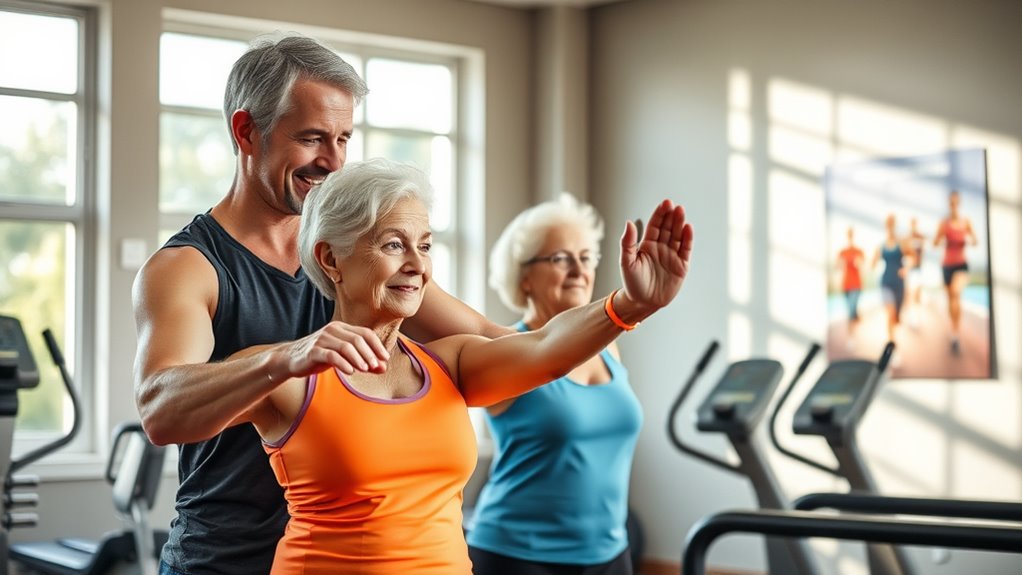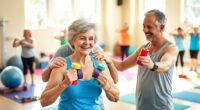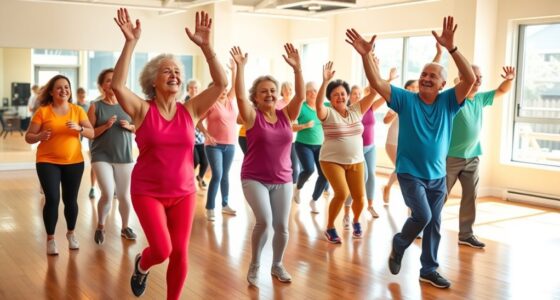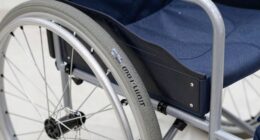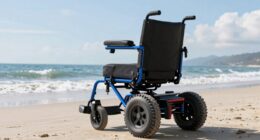Geriatric personal trainers specialize in creating tailored fitness programs for seniors. They assess your medical history and current fitness levels to guarantee safety while enhancing strength, balance, and mobility. Their expertise includes adapting exercises for specific conditions like arthritis and Parkinson’s. Plus, they help foster a supportive fitness community, leading to lasting friendships and increased motivation. With personalized care, you can improve your overall well-being and independence. There’s much more to explore about how they can transform your fitness journey!
Key Takeaways
- Geriatric personal trainers create customized fitness programs based on seniors’ medical history, fitness levels, and personal goals to maximize safety and effectiveness.
- These trainers focus on improving strength and balance to prevent falls and enhance daily functional activities for greater independence.
- Programs include adaptive exercises for specific conditions like arthritis and Parkinson’s, ensuring exercises are safe and appropriate for individual capabilities.
- Collaboration with healthcare professionals ensures comprehensive support and tailored assessments, reinforcing accountability and recovery goals for seniors.
- Engaging in group fitness classes fosters social interaction, motivation, and emotional support, enhancing the overall fitness experience for seniors.
The Importance of Geriatric Personal Trainers
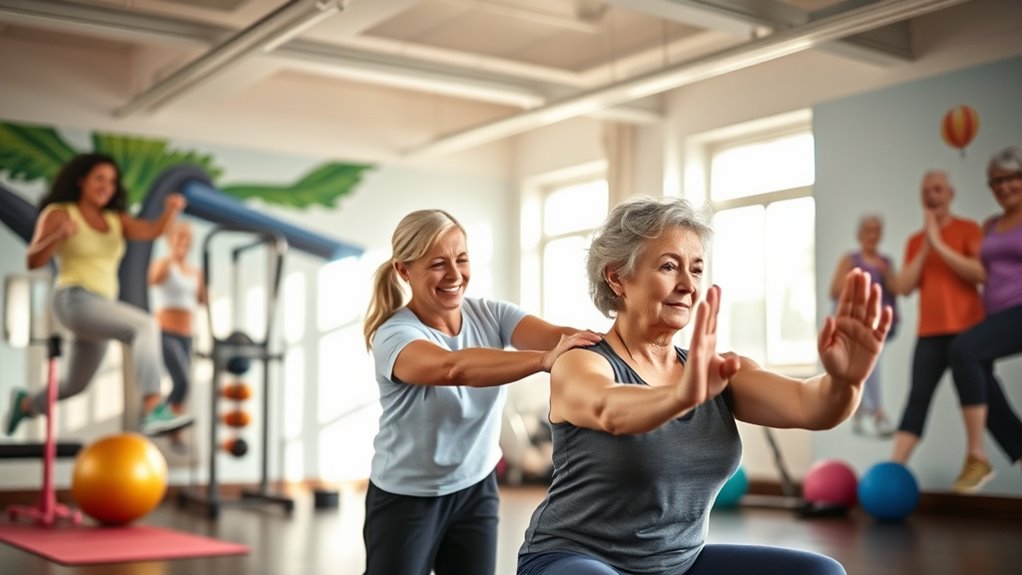
As you age, staying active becomes essential for maintaining your health and well-being, which is where geriatric personal trainers come in.
These specialized trainers create tailored fitness programs that cater to your unique needs. With expertise in adaptive and corrective exercise techniques, they help accommodate conditions like arthritis and Parkinson’s disease, ensuring safety and effectiveness in your routines. Regular physical activity can significantly reduce the risk of chronic diseases associated with aging. Additionally, engaging in regular exercise contributes to enhancing life at home by improving mobility and independence. Geriatric personal trainers can also provide guidance on advance directives, ensuring that your health and fitness goals align with your overall well-being. They help clients understand the importance of emotional readiness in maintaining a balanced approach to fitness and overall health.
Geriatric personal trainers conduct thorough assessments, reviewing your medical history to design individualized workout plans that align with your fitness goals. By collaborating with healthcare professionals, they provide holistic support, enhancing your overall health. Furthermore, they can assist in identifying permanent vs. temporary hearing loss, ensuring your fitness journey is complemented by appropriate hearing health considerations.
Beyond physical fitness, these trainers promote social interaction and mental well-being, considerably improving your quality of life and making Senior Fitness more enjoyable and effective.
Understanding Age-Related Physiological Changes

Understanding the physiological changes that come with aging is essential for maintaining your health and fitness.
Recognizing the physiological changes of aging is crucial for sustaining health and fitness throughout the years.
As you age, you’ll notice several shifts that can impact your fitness level and overall well-being:
- Decreased muscle mass and strength (sarcopenia)
- Decline in bone density, increasing fracture risk
- Reduced cardiovascular health, affecting heart efficiency
- Diminished flexibility and joint mobility, raising injury susceptibility
- Potential decline in cognitive function, impacting coordination and balance. Emotional and psychological growth occurs in stages, which can influence motivation and adherence to fitness regimens. Additionally, understanding the role of financial planning for assisted living can help ensure that you have the resources necessary to maintain your fitness and health as you age. Incorporating regular strength training can help combat sarcopenia and preserve muscle mass.
Recognizing the importance of emotional regulation can also aid in developing a consistent fitness routine as you navigate the challenges of aging.
These changes can lead to chronic conditions that may hinder your ability to stay active. Furthermore, embracing sustainable fashion can encourage a more mindful lifestyle that supports overall well-being.
Tailored Exercise Programs for Seniors
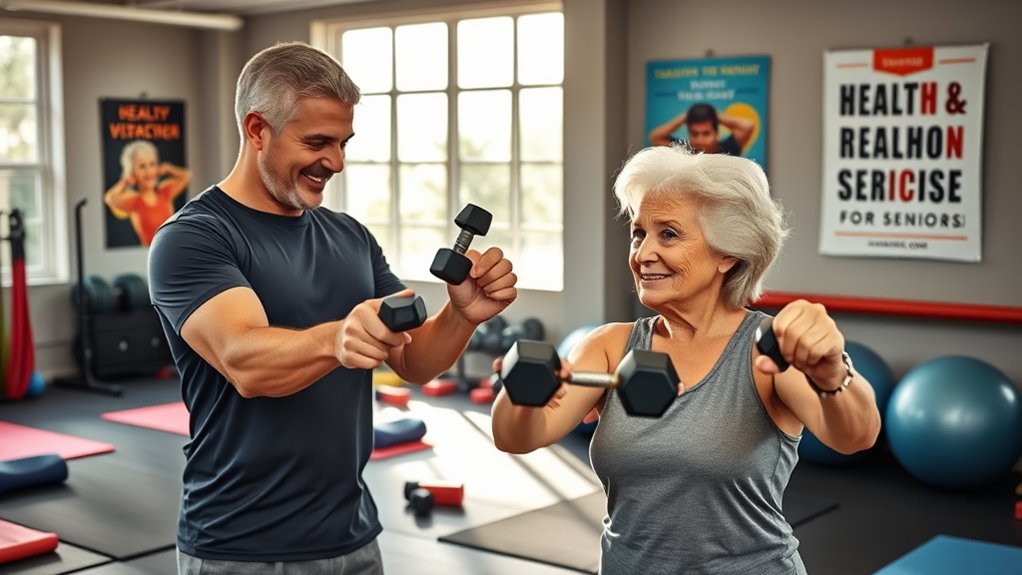
When it comes to fitness for seniors, tailored exercise programs play an essential role in addressing individual needs and goals.
These programs consider your medical history, fitness levels, and personal objectives to create safe and effective workouts. Typically, they incorporate strength training, balance exercises, flexibility routines, and cardiovascular activities, enhancing overall mobility and reducing fall risks. Additionally, awareness of newborn safety guidelines can help seniors prioritize their health and seek timely medical attention when needed. Incorporating whole foods into your diet can further support your fitness journey and overall health. Engaging in outdoor activities can also provide additional benefits such as improved mood and social interaction. Utilizing vertical storage solutions in your living space can help seniors maintain a clutter-free environment, contributing to better overall well-being.
Trained instructors conduct thorough assessments to design specific workout plans that adapt to your evolving fitness capabilities. Many specialists also emphasize group classes, fostering social interaction, motivation, and accountability.
Regular progress assessments guarantee you stay engaged and continually meet your fitness goals, keeping your journey towards better health enjoyable and rewarding. Tailored exercise programs truly make a difference in senior fitness. Additionally, awareness of breast cancer symptoms can help seniors prioritize their health and seek timely medical attention when needed.
Safety Considerations in Senior Fitness Training
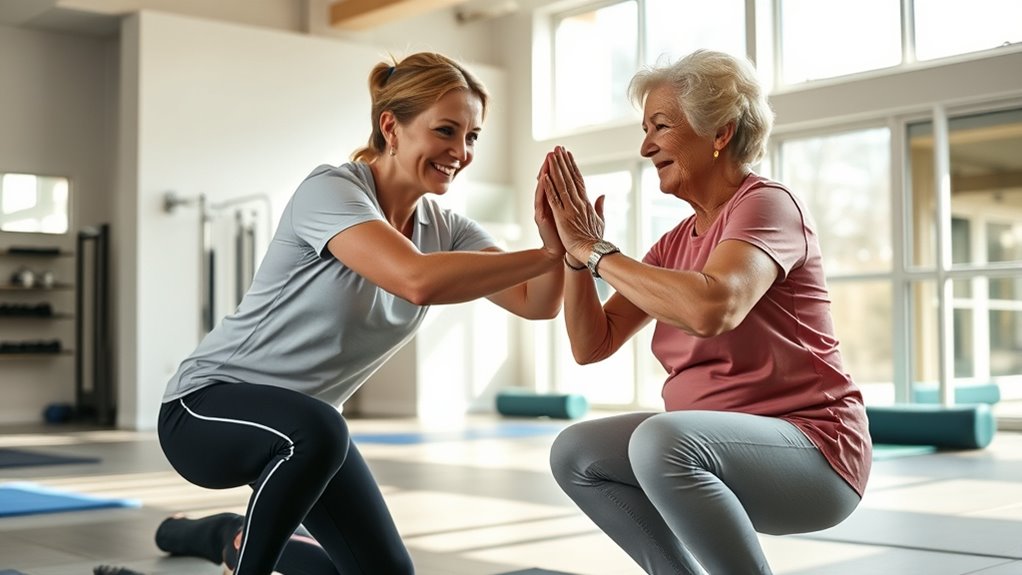
When training seniors, it’s essential to assess their medical history and physical abilities first. This way, you can create tailored exercise programs that minimize injury risks while maximizing benefits. Additionally, incorporating aspects of mental wellbeing can further enhance their overall fitness experience and promote emotional resilience. Understanding the importance of emotional expression can also help trainers support seniors in managing stress and improving their mental health during fitness routines. Building a strong foundation of unconditional support can greatly encourage seniors to engage more actively in their fitness journeys. Furthermore, incorporating mindfulness practices into training sessions can enhance self-awareness and improve focus during exercises. Furthermore, trainers should be aware of the potential impact of work-life balance on seniors’ motivation and ability to participate in fitness programs.
Importance of Assessment
Here are key components of a detailed assessment:
- Review of medical history
- Evaluation of current fitness levels
- Identification of existing health conditions
- Assessment of mobility and gait
- Collaboration with healthcare professionals
Additionally, understanding the importance of security systems can help create a safe environment for seniors during their fitness routines.
Tailored Exercise Programs
Tailored exercise programs are essential for guaranteeing seniors engage in safe and effective fitness training. Personal trainers take into account each individual’s medical history, designing exercise programs that address specific health conditions like arthritis and osteoporosis.
They conduct thorough assessments to create personalized workout plans prioritizing mobility, balance, and strength, which helps reduce injury risks. Trainers also utilize adaptive programs and corrective techniques to address common age-related concerns, enhancing functional independence.
Safety considerations include using simple language for instructions and effective cueing to accommodate diverse learning styles and physical impairments.
Additionally, regular communication with your healthcare professionals guarantees your exercise program aligns with any ongoing medical treatments or rehabilitation needs, further enhancing safety and effectiveness.
Enhancing Mobility and Independence
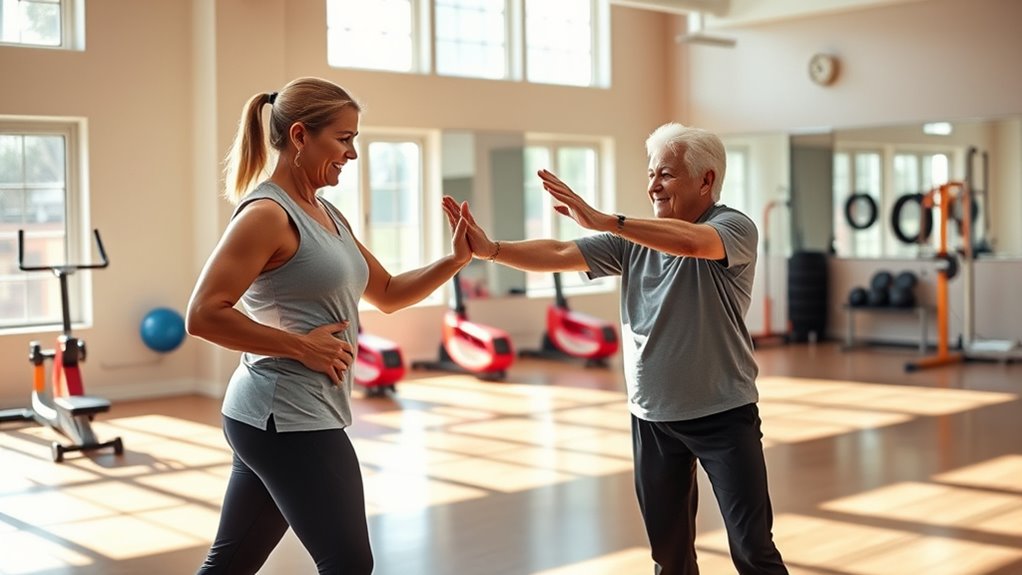
Enhancing mobility and independence is essential for seniors seeking to maintain an active lifestyle. By participating in personalized fitness programs, you can considerably improve your physical capabilities and overall well-being.
Here are some benefits you can expect:
- Tailored exercises that fit your unique needs
- Increased strength and balance to prevent falls
- Adaptive programs for conditions like arthritis or Parkinson’s
- Functional exercises that mimic daily activities
- Opportunities for social interaction and emotional support
With the guidance of a geriatric personal trainer, you’ll focus on safe movement patterns and effective routines.
This approach not only boosts your mobility but also promotes self-sufficiency, allowing you to enjoy your independence to the fullest.
Stay active, stay independent!
Fostering Communication With Healthcare Professionals
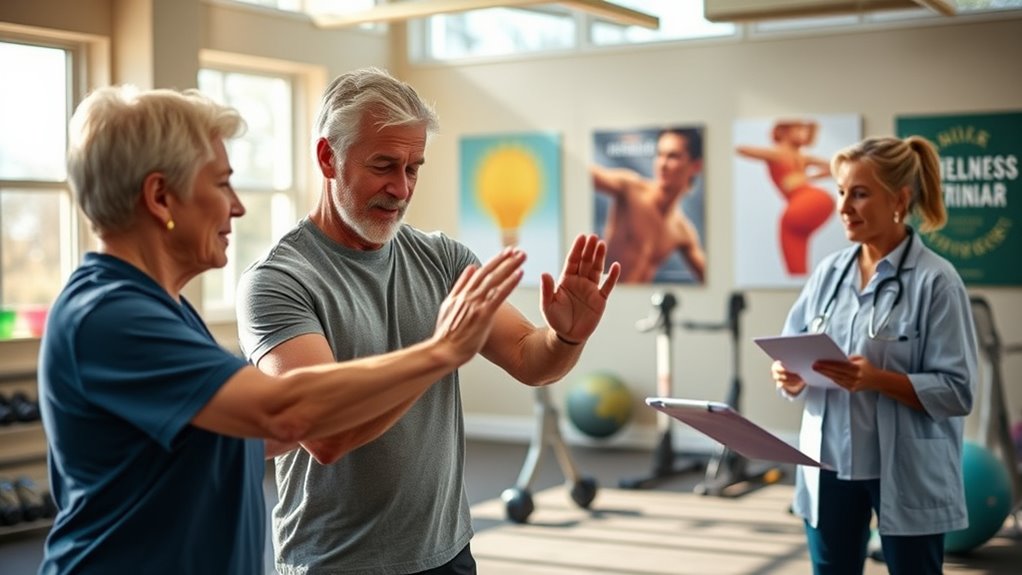
When you engage with a geriatric personal trainer, you’re not just investing in your fitness; you’re also building a bridge to better communication with your healthcare professionals.
Effective communication between trainers and healthcare providers enhances client outcomes, ensuring your fitness training aligns with medical recommendations. Your trainer may collaborate with physicians and therapists, sharing assessments and progress updates that foster a thorough approach to your care.
Regular check-ins help reinforce accountability and support your recovery and fitness goals. By reviewing your medical history, trainers can tailor exercise programs that accommodate chronic conditions.
This supportive network creates a well-rounded fitness strategy that addresses both your physical and emotional well-being, helping you lead a healthier lifestyle as a senior.
The Role of Nutrition in Senior Fitness
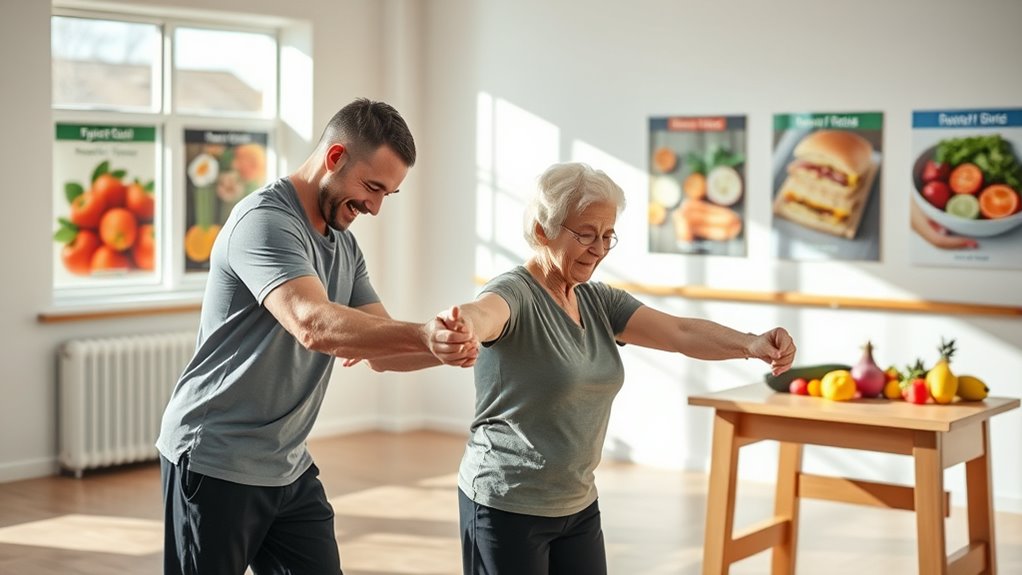
Nutrition plays an essential role in your fitness journey as a senior. A healthy diet supports muscle maintenance, bone density, and overall health, reducing chronic illness risks.
Here are key nutrition tips for you:
- Prioritize protein intake (1.0 to 1.2 grams per kilogram of body weight daily) for muscle repair and growth.
- Fill your plate with nutrient-dense foods like fruits, vegetables, whole grains, and healthy fats.
- Stay hydrated to support cognitive function and prevent dehydration.
- Incorporate vitamins and minerals crucial for energy and immune function.
- Consult with nutrition professionals for personalized dietary plans that align with your fitness goals.
Building a Supportive Fitness Community

Building a supportive fitness community can transform your exercise experience.
When you engage with others, you not only foster motivation but also create lasting connections that make workouts enjoyable.
Together, you can overcome challenges, celebrate achievements, and combat feelings of isolation.
Encouraging Social Interaction
Creating a supportive fitness community is essential for seniors, as it not only boosts physical activity but also enhances social interaction. Engaging in group fitness classes allows you to connect with others while improving your health.
Here are some benefits of fostering a social environment in your training sessions:
- Builds lasting friendships
- Reduces feelings of isolation
- Encourages regular attendance
- Increases motivation through shared goals
- Enhances overall well-being
When trainers include team-based activities and social events, exercise becomes more enjoyable and less intimidating.
These connections can lead to better adherence to your fitness routine, ensuring you achieve long-term health benefits. So, embrace the power of community in your fitness journey!
Fostering Group Motivation
When you engage in group fitness sessions, not only do you enhance your physical health, but you also tap into a powerful source of motivation. The supportive atmosphere fosters community engagement, making workouts enjoyable and encouraging. In these settings, you’re likely to experience uplifting moments as you and your peers celebrate achievements together.
| Benefit | Group Motivation | Community Engagement |
|---|---|---|
| Increased Accountability | Regular check-ins with trainers | Shared experiences and friendships |
| Enhanced Enjoyment | Fun, collaborative exercises | Reduced feelings of isolation |
| Higher Satisfaction | Collective progress celebrations | Long-term commitment support |
Building Lasting Connections
A supportive fitness community for seniors not only boosts motivation but also strengthens the bonds among participants. By focusing on building relationships, you create an environment where everyone feels welcome and engaged.
- Regular check-ins from trainers enhance accountability.
- Group sessions offer emotional support and shared experiences.
- Community engagement improves overall well-being.
- Newcomers find a friendly atmosphere to thrive in.
- Seasoned exercisers can share their wisdom and encouragement.
When you actively participate in these programs, you’ll notice how connections foster motivation and commitment to your fitness journey.
Engaging with others not only makes exercising more enjoyable but also provides a network of support, making each step toward your goals feel achievable.
Success Stories: Transformations Through Geriatric Training

As seniors commence on their fitness journeys, countless success stories emerge, illustrating the transformative power of geriatric training. Clients like Mary-Austin have reported significant improvements in strength and independence through tailored training programs. Ethel’s mother-in-law has enjoyed enhanced quality of life, showcasing the benefits of personalized fitness.
| Client Name | Key Improvement | Trainer’s Role |
|---|---|---|
| Mary-Austin | Increased strength | Tailored training programs |
| Ethel’s Mother-in-Law | Enhanced quality of life | Personalized fitness approach |
| Charles Savinar | Overall well-being improvement | Consistent, individualized care |
Rico observed his mother’s happiness and mobility improve, highlighting the social interaction that these programs foster. Bryan emphasized the satisfaction of having a trainer who truly understands individual needs.
Frequently Asked Questions
Does Medicare Pay for a Personal Trainer?
Medicare doesn’t typically pay for personal trainers since it views fitness training as preventive rather than medically necessary.
However, if you have a Medicare Advantage plan, you might find some additional benefits that cover fitness-related expenses, including personal training.
It’s essential to check with your Medicare plan provider to see what services are covered and if you can access any discounts or reimbursements for personal training through health savings accounts or flexible spending accounts.
What Is the Best Fitness Program for Seniors?
When it comes to staying spry and vibrant, you’ll find that the best fitness programs for seniors are tailored to your unique needs.
These programs focus on gentle, low-impact exercises that boost mobility, strength, and balance—helping you feel more secure on your feet. Incorporating group classes can enhance your social life while keeping you motivated.
Regularly updating your routine guarantees it stays fresh and effective, making every step you take a step toward vibrancy.
Is There a Market for Older Personal Trainers?
Yes, there’s definitely a market for older personal trainers.
With your life experience and understanding of the challenges seniors face, you can connect better with clients.
Many older adults prefer trainers who can relate to their experiences and offer tailored fitness plans.
As the population ages, the demand for trainers specializing in senior fitness is growing.
If you have the right certifications, you can tap into this lucrative niche and make a real difference.
What Does a Senior Fitness Specialist Do?
Imagine a superhero, cape fluttering, swooping in to save seniors from the clutches of inactivity! A senior fitness specialist does just that.
They craft personalized exercise plans, assess your medical history, and evaluate your physical abilities. Their focus is on strength, balance, and flexibility, ensuring you can conquer daily tasks with ease.
Conclusion
In the journey of aging, embracing the expertise of geriatric personal trainers can be your guiding star, much like Virgil leading Dante through the complexities of life. By prioritizing tailored exercise, safety, and nutrition, you’re not just enhancing your physical health; you’re reclaiming your independence and energy. Remember, every step you take strengthens your body and spirit, weaving you into a supportive community that celebrates the beauty of aging with grace and resilience.
